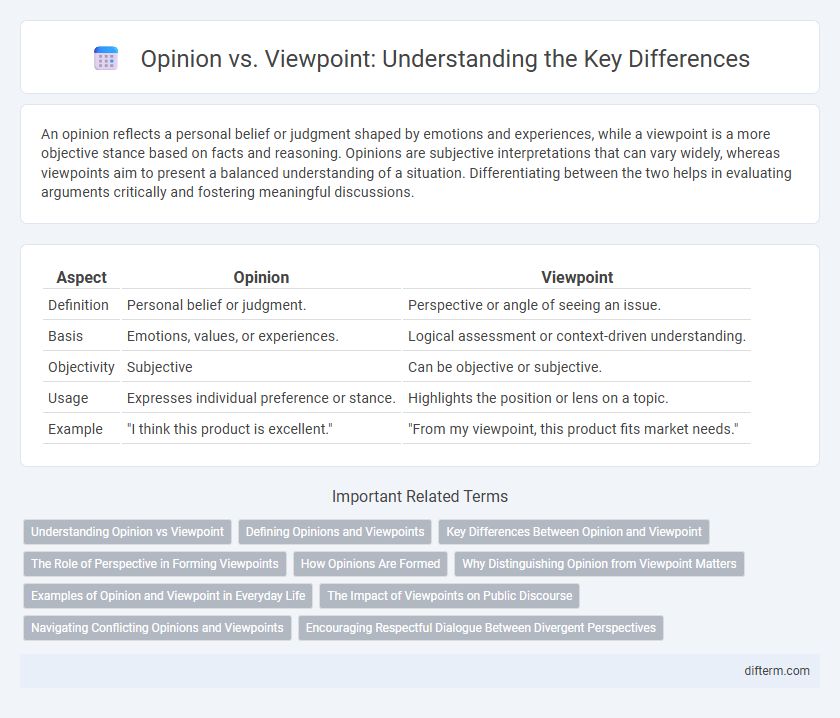An opinion reflects a personal belief or judgment shaped by emotions and experiences, while a viewpoint is a more objective stance based on facts and reasoning. Opinions are subjective interpretations that can vary widely, whereas viewpoints aim to present a balanced understanding of a situation. Differentiating between the two helps in evaluating arguments critically and fostering meaningful discussions.
Table of Comparison
| Aspect | Opinion | Viewpoint |
|---|---|---|
| Definition | Personal belief or judgment. | Perspective or angle of seeing an issue. |
| Basis | Emotions, values, or experiences. | Logical assessment or context-driven understanding. |
| Objectivity | Subjective | Can be objective or subjective. |
| Usage | Expresses individual preference or stance. | Highlights the position or lens on a topic. |
| Example | "I think this product is excellent." | "From my viewpoint, this product fits market needs." |
Understanding Opinion vs Viewpoint
Opinion centers on a personal belief or judgment formed about a particular issue, often influenced by emotions and experiences. Viewpoint refers to a more structured stance or perspective shaped by analysis and factual understanding. Recognizing the distinction between opinion and viewpoint enhances critical thinking and effective communication.
Defining Opinions and Viewpoints
Opinions are personal beliefs or judgments that reflect individual preferences and emotions, often shaped by experiences and values. Viewpoints represent more structured perspectives based on facts, reasoning, and a broader consideration of evidence. Defining opinions involves understanding subjective, affective stances, while viewpoints emphasize objective, analytical positions within a given discourse.
Key Differences Between Opinion and Viewpoint
Opinion refers to a personal belief or judgment formed without complete evidence, often influenced by emotions and individual experiences. Viewpoint, however, emphasizes a particular perspective shaped by context, background, or specific situation. Key differences between opinion and viewpoint include their basis; opinions are subjective and internal, while viewpoints incorporate external factors and can be more objective or broader in scope.
The Role of Perspective in Forming Viewpoints
Perspective shapes the foundation of a viewpoint by filtering experiences, values, and knowledge through an individual's unique lens. Unlike opinions, which can be based on fleeting emotions or incomplete information, viewpoints are deeply rooted in a consistent cognitive framework that emphasizes understanding and reasoning. This role of perspective ensures that viewpoints offer a more stable, nuanced interpretation of complex issues in comparison to simple opinions.
How Opinions Are Formed
Opinions are formed through a combination of personal experiences, emotions, and cultural influences that shape individual perspectives. Cognitive biases and information exposure play significant roles in the development and reinforcement of opinions over time. Unlike viewpoints, which can be more neutral and observational, opinions reflect subjective judgments and attitudes deeply rooted in one's identity and belief system.
Why Distinguishing Opinion from Viewpoint Matters
Distinguishing opinion from viewpoint matters because opinions reflect personal beliefs influenced by emotions, while viewpoints represent more objective perspectives shaped by factual information. Understanding this difference enhances critical thinking, enabling clearer communication and reducing misunderstandings in discussions. Recognizing the distinction also promotes open-mindedness, allowing individuals to evaluate information more fairly and engage constructively with differing perspectives.
Examples of Opinion and Viewpoint in Everyday Life
Opinion and viewpoint both reflect personal perspectives but differ in depth and flexibility; an opinion often involves a strong belief, such as preferring tea over coffee, while a viewpoint might consider broader aspects, like evaluating different drink preferences based on health benefits. In everyday life, opinions are seen in choices such as favoring a particular sports team, while viewpoints emerge in discussions about cultural traditions or political policies where multiple angles are considered. Distinguishing between the two helps clarify communication and fosters better understanding in social interactions.
The Impact of Viewpoints on Public Discourse
Viewpoints shape public discourse by providing diverse lenses through which issues are interpreted, influencing collective understanding and decision-making processes. Unlike opinions, which reflect personal beliefs, viewpoints encompass broader perspectives that affect societal narratives and policy debates. The dynamic interplay of varied viewpoints fosters critical dialogue, promoting a more inclusive and informed public arena.
Navigating Conflicting Opinions and Viewpoints
Opinions represent personal beliefs shaped by individual experiences, while viewpoints encompass broader perspectives influenced by culture, knowledge, and context. Navigating conflicting opinions and viewpoints requires understanding underlying assumptions and respecting diversity in thought to foster constructive dialogue. Effective communication bridges gaps by emphasizing common ground and encouraging open-mindedness amidst disagreement.
Encouraging Respectful Dialogue Between Divergent Perspectives
Encouraging respectful dialogue between divergent perspectives fosters understanding and bridges gaps in opinion and viewpoint distinctions. Recognizing that opinions are personal beliefs while viewpoints represent broader angles allows conversations to remain open and constructive. Emphasizing active listening and empathy promotes mutual respect and diminishes conflict in discussions.
opinion vs viewpoint Infographic

 difterm.com
difterm.com